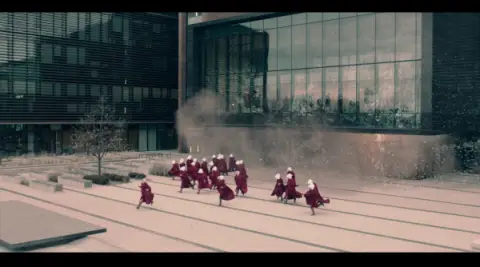The Handmaid’s Tale: Season 2/ Episode 6 “First Blood” – Recap/ Review (with Spoilers)
As Serena Joy and June continue their complicated relationship, something possibly game-changing happens at the end of the episode. Network Hulu Director(s) Mike Barker Writer(s) Eric Tuchman Air Date 5/23/2018 Be Mindful of Eden: Eden, Nick, June, Serena Joy With Eden being 15, and a bit delicate, life in the Waterford household is a bit…

Spoiler Alert: This summary and review contains spoilers.
Additionally, some images and text may include affiliate links, meaning we may earn a commission or receive products if you make a purchase.
As Serena Joy and June continue their complicated relationship, something possibly game-changing happens at the end of the episode.
| Network | |
| Hulu | |
| Director(s) | Mike Barker |
| Writer(s) | Eric Tuchman |
| Air Date | 5/23/2018 |
Be Mindful of Eden: Eden, Nick, June, Serena Joy
With Eden being 15, and a bit delicate, life in the Waterford household is a bit awkward. Nick is a bit distant, the tension in the air makes it where you feel the need to be mindful, and clearly Mrs. Waterford and June have beef. Something shown, after the events of the next topic, to have made Serena quite petty. To the point, she talks about pulling rank and dropping a crochet needle for June to pick up. Something she tries to have Eden repeat but then June claims cramps.
But for Nick, his place in this? Well, the distance comes not just because he is in love with June, but Eden is 15. Just as viewers are a bit uncomfortable, so is he. After all, Nick is at least 30 and likely remembers life before Gilead. Back when the idea of someone having sex with someone Eden’s age would not only be social taboo, and illegal, but also only appealing to a pedophile.
Yet, with Eden expressing concerns to June about Nick, even implying he might be a gender traitor (gay), June tells Nick to suck it up. Mostly in the form of not saying she loves him back and telling him to be with his wife. A decision which influences something he says later on.
Commentary
Maybe Eden might not be as noteworthy as she once seemed. Yes, seeing a child bride raised an eyebrow, as well as interest in what their upbringing was like. However, considering how world building is more the priority than character building, I think that is why I find it so hard to get into some aspects of the show. For while, as noted by Benjamin in the comments of episode 5, the novel didn’t venture too far outside of the Gilead we saw in season 1, the ooo and ahhs of seeing outside the suburbs lost luster quick.
Yes, the colonies are desolate and the four horseman nod made it seem even more terrifying. That is, alongside seeing the econopeople and wanting to take note how those not in the upper classes live. However, we aren’t really given a notable guide to keep us hooked. Yes, Emily and Janine are in the colonies, but they aren’t giving the ebb and flow storyline of June to push you to wonder if they may fight back, try to escape, or do more than slowly die as the environment kills them. With the econo-people, Omar was our gateway in and as soon as we met him, within an episode, he was hanging, family disbanded, and that was it.
So, taking note of that, even how Canada has been handled thus far, while it is nice to visit these different locations and get a small taste of the culture, it’s like the difference between taking a vacation and living somewhere. Yes, taking an episode or a few scenes in any of these places is a nice escape, but what reasons are we being given to want more outside of relief from June’s story?
Just When I Thought We Could Be Friends: Serena Joy, Fred, June
As noted before, Serena Joy is lonely. The rest of the wives don’t stimulate her and so, with June having a bit of a fire in her belly, there is some desire to be friends. Perhaps beyond the hope she won’t run away with “her” child. But, the problem is, there is not only jealousy but different principals in play here. After all, lest we forget, there was a time when Serena Joy wasn’t just a housewife.
In a way, she was on the front lines, doing speeches and even touring until she got shot in the abdomen and likely lost the ability to have children. Yet, she pushed forward with helping Fred with his speeches and might have even continued to speak herself. From what it seems, though scared off a stage, she felt empowered when she gave an impromptu speech on the stairs.
Though, in terms of the present? She takes joy in bringing June to heel. For she might not have gotten to do so with the crowd who called her a fascist and nazi, but at least this radical she has power over. So, if she doesn’t want to be friends, wants to continue bringing up the past and even attempt to manipulate Serena, then she’ll be treated as per where she is in the caste system.
Commentary

Is it wrong to want to feel for Serena Joy? Just as she was perhaps gaining prominence as a speaker she got shot and, if she was once a viable mother, then she lost the ability with a bullet. On top of that, as seen in season 1, there came a point when Fred shut her out despite him constantly looking for her to advise on his speeches. And yeah, I know she is a terrible person to June, but it increasingly is complicated.
For the way I see it is, Serena Joy’s jealousy of June goes beyond being able to get pregnant. June has the guts to try to escape the situation for better. She has the gift of gab to allure or seduce anyone. Heck, when it comes to the Handmaids, she was able to get a large swath of them to rebel. All of who were punished and yet when invited over for a handmaid, seriously low-key, baby shower type of brunch, it was like the punishment June escaped didn’t happen.
Which bring up a thought: How do the rest of the handmaids feel about June? She has tried to escape, protected Janine from a stoning, was omitted from a punishment because she is pregnant, and who knows if there might be rumors about her other actions. Heck, bringing up the idea of what the handmaids say amongst themselves, since we haven’t seen them really do a whole lot of private conversations this season, imagine what the aunts talk about.
Tick, Tick, BOOM: June, Fred, Nick
While it isn’t clear whether or not Serena’s shooters were affiliated with a group or not, what is known is Fred got revenge by killing the shooter’s wife. That and he still has the hots for June. Someone who he gropes and tries to have sex with, but then she stops him because of the baby. Well, and because making things easier for him will make it harder to get what she wants later. Such as more than just being given a picture of Hannah but maybe, physically, getting to see her.
Though, all hopes for that may be gone soon. For one, Nick is looking to be reassigned and implies there is stuff he hasn’t said about Fred which, of course, leads to perked ears. However, the big thing is a terrorist attack during the opening of a new processing center which likely killed quite a few commanders. Leaving the future of Gilead to question.
Commentary
There is a natural desire to question, when will Gilead fall, how will it happen, and who will be the cause of it? Well, while a date isn’t clear, it seems a rebel handmaid might at least answer who. For even if, in that room, that wasn’t all the commanders, at least for that region, maybe a few others, that was a large amount. Which could mean chaos amongst Gilead and possibly a sign of weakness. One which other countries might take advantage of for Gilead has quite a bit of resources.
Not just handmaids, mind you, but food as well and between suffocating them with sanctions, which I believe some countries already are doing, or aiding coups, they could support a full-on rebellion. However, as seen when stuff like that happens in other countries, it pushes you to question what would that mean for the characters who haven’t crossed the border. Gilead has the look of being under martial order and taking note of the early days, when June and Moira were dodging bullets, while random attacks can happen, maybe even succeed, toppling Gilead as they did the former administration may not be an easy task.
However, considering a woman is the bomber and how they seemingly have quite a network, it wouldn’t be smart to bet again the underdog.
Highlights
- The intrigue which is presented with the ending. Be it Nick pursuing being reassigned, as well as hinting something isn’t right with Fred and June, alongside the terrorist attack.
- Understanding the pain of Serena Joy further by delving into her past. Thus allowing us to see why she is not only miserable but all over the place when it comes to her relationship with June.
On The Fence
- Visually getting to see other parts of the world and cultures, but feeling like the characters who inhabit that aren’t given a full-scale
Follow Wherever I Look on Twitter, Like us on Facebook and Subscribe to the YouTube Channel.
Previous Episode’s Recap
[visual-link-preview encoded=”eyJ0eXBlIjoiaW50ZXJuYWwiLCJwb3N0IjoyMDg5MiwicG9zdF9sYWJlbCI6IlBvc3QgMjA4OTIgLSBUaGUgSGFuZG1haWQncyBUYWxlOiBTZWFzb24gMi8gRXBpc29kZSA1IFwiU2VlZHNcIiAtIFJlY2FwLyBSZXZpZXcgKHdpdGggU3BvaWxlcnMpIiwidXJsIjoiIiwiaW1hZ2VfaWQiOjIwODk2LCJpbWFnZV91cmwiOiJodHRwczovL3doZXJldmVyLWktbG9vay5jb20vd3AtY29udGVudC91cGxvYWRzLzIwMTgvMDUvVGhlLUhhbmRtYWlkcy1UYWxlLVNlYXNvbi0yLUVwaXNvZGUtNS1TZWVkcy1KdW5lLnBuZyIsInRpdGxlIjoiVGhlIEhhbmRtYWlkJ3MgVGFsZTogU2Vhc29uIDIvIEVwaXNvZGUgNSBcIlNlZWRzXCIgLSBSZWNhcC8gUmV2aWV3ICh3aXRoIFNwb2lsZXJzKSIsInN1bW1hcnkiOiJKdXN0IGFzIGl0IHNlZW1lZCB0aGUgd29ybGQgYnJva2UgYW5kIGtpbGxlZCBKdW5lIGFuZCBzaGUgaGFzIGFzc3VtZWQgdGhlIHJvbGUgb2YgT2ZmcmVkLCBzaGUgZ2V0cyB0d28gc2VyaW91cyB3YWtlLXVwIGNhbGxzLiIsInRlbXBsYXRlIjoiZGVmYXVsdCJ9″]
Check Out Other TV Recaps
TV Shows We’re Covering This Season
Images used for editorial and commentary purposes. All rights remain with their respective copyright holders.





